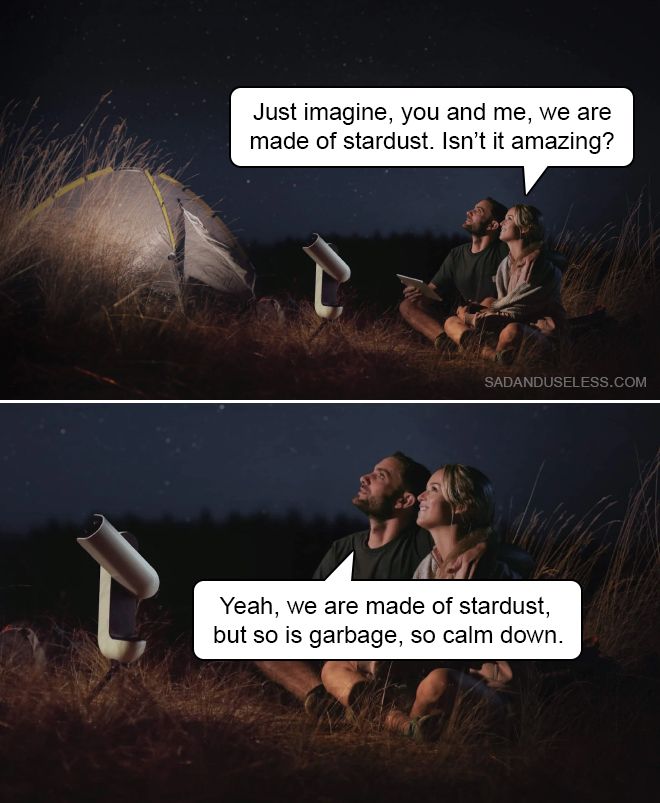Mildly interesting
-
There is hope:
The universe could possibly avoid eternal heat death through random quantum tunneling and quantum fluctuations, given the non-zero probability of producing a new Big Bang in roughly 10^10^10^56 years
from: https://en.wikipedia.org/wiki/Future_of_an_expanding_universe
@Klaus said in Mildly interesting:
The universe could possibly avoid eternal heat death through random quantum tunneling and quantum fluctuations, given the non-zero probability of producing a new Big Bang in roughly 10^10^10^56 years
Oh, thank you. That clears it all up nicely.

-
@Catseye3 said in Mildly interesting:
@George-K How old I was ten seconds ago when I redd your post.
You need a serious torqueing-to.
-
@mark said in Mildly interesting:

That belongs in the dark and inappropriate thread. I mean, mostly dark. Really dark.
-
-

Yes, I've been thinking for quite a while that:
-
Over the long haul, darkness will triumph over light.
-
When we homo sapiens express philosophical/religious preference for "light," what we really desire is information/knowledge. We use "light" as a shorthand for "information" because we have evolved to primarily use sight (that depends on light) as our primary means of acquiring information. Had we evolved to use sonar to map out our surroundings, we would be waxing philosophy about "sound triumphing over silence" instead of "light triumphing over darkness." And even than, "silence" will win over the long haul.
-
-

Yes, I've been thinking for quite a while that:
-
Over the long haul, darkness will triumph over light.
-
When we homo sapiens express philosophical/religious preference for "light," what we really desire is information/knowledge. We use "light" as a shorthand for "information" because we have evolved to primarily use sight (that depends on light) as our primary means of acquiring information. Had we evolved to use sonar to map out our surroundings, we would be waxing philosophy about "sound triumphing over silence" instead of "light triumphing over darkness." And even than, "silence" will win over the long haul.
-
-

Yes, I've been thinking for quite a while that:
-
Over the long haul, darkness will triumph over light.
-
When we homo sapiens express philosophical/religious preference for "light," what we really desire is information/knowledge. We use "light" as a shorthand for "information" because we have evolved to primarily use sight (that depends on light) as our primary means of acquiring information. Had we evolved to use sonar to map out our surroundings, we would be waxing philosophy about "sound triumphing over silence" instead of "light triumphing over darkness." And even than, "silence" will win over the long haul.
@Axtremus said in Mildly interesting:

Yes, I've been thinking for quite a while that:
-
Over the long haul, darkness will triumph over light.
-
When we homo sapiens express philosophical/religious preference for "light," what we really desire is information/knowledge. We use "light" as a shorthand for "information" because we have evolved to primarily use sight (that depends on light) as our primary means of acquiring information. Had we evolved to use sonar to map out our surroundings, we would be waxing philosophy about "sound triumphing over silence" instead of "light triumphing over darkness." And even than, "silence" will win over the long haul.
Couldn't provide a better example of what happens when you get too much STEM education and think you can apply it to everything. Great job, Ax.

-
-
Times of India: "Traditional education is focused on replicating the correct hypothesises, while one of the most important pillars of STEM module is to build creativity. STEM is focused on stimulating the brain and giving it a free reign to create, rather than simply replicate what is already known to the world."
-
@Axtremus said in Mildly interesting:

Yes, I've been thinking for quite a while that:
-
Over the long haul, darkness will triumph over light.
-
When we homo sapiens express philosophical/religious preference for "light," what we really desire is information/knowledge. We use "light" as a shorthand for "information" because we have evolved to primarily use sight (that depends on light) as our primary means of acquiring information. Had we evolved to use sonar to map out our surroundings, we would be waxing philosophy about "sound triumphing over silence" instead of "light triumphing over darkness." And even than, "silence" will win over the long haul.
Couldn't provide a better example of what happens when you get too much STEM education and think you can apply it to everything. Great job, Ax.

@Aqua-Letifer said in Mildly interesting:
Couldn't provide a better example of what happens when you get too much STEM education and think you can apply it to everything.
-
No such thing as "too much STEM education."
-
Even if there is, it's still better than the flip side "not enough STEM education."
-
One good thing about STEM education, if you learn it right, is that it teaches and encourages you to know and specify the limits regarding where you can apply or what you can do with a particular teaching (e.g., a formula, equation, or method), to openly admit error terms and confidence levels. Where a philosophy or religious teacher often claim "this is universal truth," a STEM teacher's standard mode of operation is to carefully qualify "this is true only when conditions X, Y, Z, ... are satisfied," and where physical systems are concerned, often followed by "these are the ways things can turn out differently from predictions using our method, how likely, and by how much."
-
-
@Aqua-Letifer said in Mildly interesting:
Couldn't provide a better example of what happens when you get too much STEM education and think you can apply it to everything.
-
No such thing as "too much STEM education."
-
Even if there is, it's still better than the flip side "not enough STEM education."
-
One good thing about STEM education, if you learn it right, is that it teaches and encourages you to know and specify the limits regarding where you can apply or what you can do with a particular teaching (e.g., a formula, equation, or method), to openly admit error terms and confidence levels. Where a philosophy or religious teacher often claim "this is universal truth," a STEM teacher's standard mode of operation is to carefully qualify "this is true only when conditions X, Y, Z, ... are satisfied," and where physical systems are concerned, often followed by "these are the ways things can turn out differently from predictions using our method, how likely, and by how much."
@Axtremus said in Mildly interesting:
@Aqua-Letifer said in Mildly interesting:
Couldn't provide a better example of what happens when you get too much STEM education and think you can apply it to everything.
- No such thing as "too much STEM education."
Ax, you're the best antithesis I know of a well-rounded person. And it's precisely because you're all in on STEM and don't value anything else.
-
-
@Axtremus said in Mildly interesting:
@Aqua-Letifer said in Mildly interesting:
Couldn't provide a better example of what happens when you get too much STEM education and think you can apply it to everything.
- No such thing as "too much STEM education."
Ax, you're the best antithesis I know of a well-rounded person. And it's precisely because you're all in on STEM and don't value anything else.
@Aqua-Letifer said in Mildly interesting:
... the best antithesis I know of a well-rounded person ...
... precisely because you're all in on STEM and don't value anything else.Non sequitur. Neither point speaks to whether there was "too much STEM education."
-
@Aqua-Letifer said in Mildly interesting:
... the best antithesis I know of a well-rounded person ...
... precisely because you're all in on STEM and don't value anything else.Non sequitur. Neither point speaks to whether there was "too much STEM education."
@Axtremus said in Mildly interesting:
@Aqua-Letifer said in Mildly interesting:
... the best antithesis I know of a well-rounded person ...
... precisely because you're all in on STEM and don't value anything else.Non sequitur. Neither point speaks to whether there was "too much STEM education."
Absolutely right. Your own posts speak to it far better than I could myself.
-
@Ivorythumper and they all taste the same, right?
@George-K said in Mildly interesting:
@Ivorythumper and they all taste the same, right?
If fed the same diet.
-
@Axtremus said in Mildly interesting:
@Aqua-Letifer said in Mildly interesting:
... the best antithesis I know of a well-rounded person ...
... precisely because you're all in on STEM and don't value anything else.Non sequitur. Neither point speaks to whether there was "too much STEM education."
Absolutely right. Your own posts speak to it far better than I could myself.
@Aqua-Letifer said in Mildly interesting:
@Axtremus said in Mildly interesting:
@Aqua-Letifer said in Mildly interesting:
... the best antithesis I know of a well-rounded person ...
... precisely because you're all in on STEM and don't value anything else.Non sequitur. Neither point speaks to whether there was "too much STEM education."
Absolutely right. Your own posts speak to it far better than I could myself.
A liberal arts education is best.
Appreciate it all...
-
@Aqua-Letifer said in Mildly interesting:
@Axtremus said in Mildly interesting:
@Aqua-Letifer said in Mildly interesting:
... the best antithesis I know of a well-rounded person ...
... precisely because you're all in on STEM and don't value anything else.Non sequitur. Neither point speaks to whether there was "too much STEM education."
Absolutely right. Your own posts speak to it far better than I could myself.
A liberal arts education is best.
Appreciate it all...
@Jolly said in Mildly interesting:
@Aqua-Letifer said in Mildly interesting:
@Axtremus said in Mildly interesting:
@Aqua-Letifer said in Mildly interesting:
... the best antithesis I know of a well-rounded person ...
... precisely because you're all in on STEM and don't value anything else.Non sequitur. Neither point speaks to whether there was "too much STEM education."
Absolutely right. Your own posts speak to it far better than I could myself.
A liberal arts education is best.
Appreciate it all...
Only downside to that is that today, there's liberal arts, and "liberal arts."
Too many schools provide only the latter.
-
@Jolly said in Mildly interesting:
@Aqua-Letifer said in Mildly interesting:
@Axtremus said in Mildly interesting:
@Aqua-Letifer said in Mildly interesting:
... the best antithesis I know of a well-rounded person ...
... precisely because you're all in on STEM and don't value anything else.Non sequitur. Neither point speaks to whether there was "too much STEM education."
Absolutely right. Your own posts speak to it far better than I could myself.
A liberal arts education is best.
Appreciate it all...
Only downside to that is that today, there's liberal arts, and "liberal arts."
Too many schools provide only the latter.
@Aqua-Letifer said in Mildly interesting:
@Jolly said in Mildly interesting:
@Aqua-Letifer said in Mildly interesting:
@Axtremus said in Mildly interesting:
@Aqua-Letifer said in Mildly interesting:
... the best antithesis I know of a well-rounded person ...
... precisely because you're all in on STEM and don't value anything else.Non sequitur. Neither point speaks to whether there was "too much STEM education."
Absolutely right. Your own posts speak to it far better than I could myself.
A liberal arts education is best.
Appreciate it all...
Only downside to that is that today, there's liberal arts, and "liberal arts."
Too many schools provide only the latter.
Yep. When they indoctrinate into wokeness, they aren’t teaching how to appreciate something subjectively, but rather to know something factually. They wrap it up in hand wavy posturing meant to carry the credibility of the scientific method.

